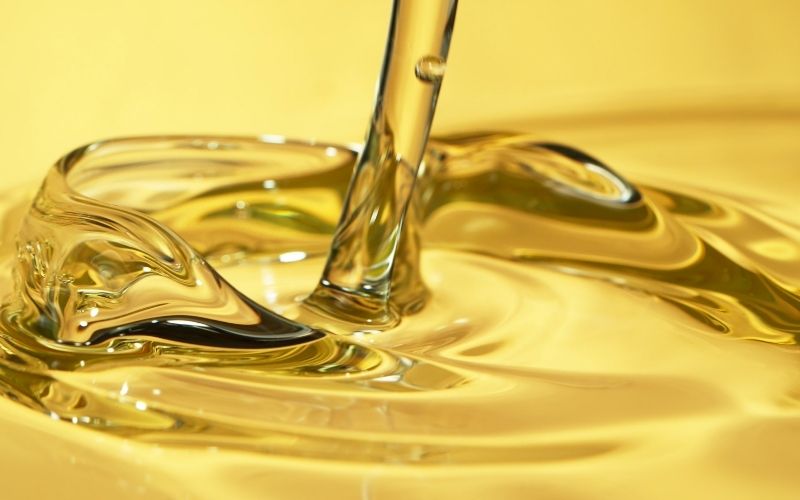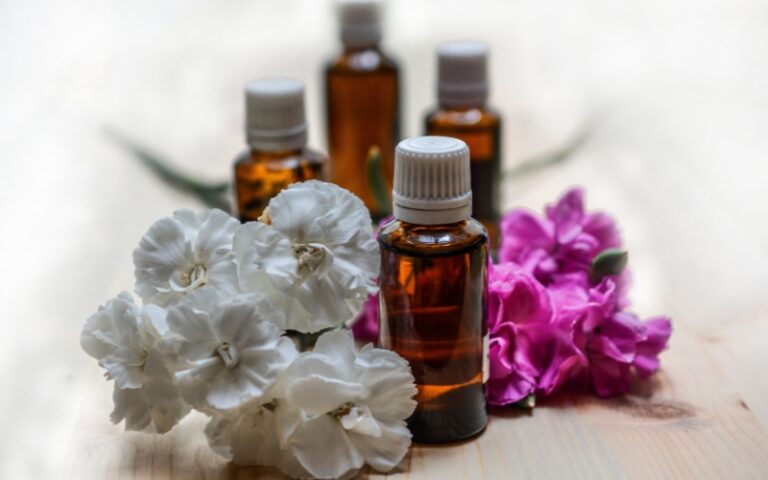Thousands Of Skincare Lovers Are Raving About Tamanu Oil: Here’s Why

Skin oils. The luxurious addition to your skincare routine that everyone loves to incorporate.
Chances are you’ve heard of all of the “typical” skincare oils, but, there’s a not-so-new kid on the block that people are starting to pay more and more attention to:
Tamanu oil.
Tamanu oil, also known as Calophyllum inophyllum oil (CIO) or Foraha oil, is great for the skincare lover that tries to stick to more natural ingredients whenever possible.
Whether you have dry skin, are trying to combat aging from UV damage, want to fight acne, or simply want to up your antioxidants in your skin routine, tamanu oil may just be the next best remedy for you to try!
Let’s dig into what this oil is and why we use it to care for our skin!
What is tamanu oil???
Tamanu oil is a natural product that is derived from a tree that is native to the coast of southeast Asia, particularly French Polynesia, and is locally referred to as “tamanu”.
The Polynesians believed it to be an ancient tree.
The scientific name is Calophyllum inophyllum and it is considered a seed oil and not an essential oil.
This tree produces a rather large nut that can be extracted for its oil which is often used for various skin conditions.
One of the fantastic things about this great oil is how diverse it is when it comes to caring for your skin’s needs!
This sticky oil has been used since the early 1900s due to its antibacterial properties, anti-inflammatory properties, and antioxidant properties.
Another property of tamanu oil is that it can also be used as a moisturizer for those struggling with dry skin!
Tamanu oil’s luxurious, thick viscosity can be a real treat for dry skin.
Tamanu oil is thought to increase collagen production and even help with wound healing.
Historically, it has been used by ancient Polynesians for a variety of ailments from healing bacterial infections caused by bacteria such as staphylococcus aureus, to a natural deodorant for body odor because of it’s subtle, natural fragrance.
Since it is a natural product, there are not many studies on the effectiveness of tamanu oil for all of these skin conditions, however, it’s a form of traditional medicine that’s been used by many to help treat skin issues like these for years.
Tamanu oil’s superpowers
Let’s dive into some of the tamanu oil benefits when it comes to our skin.
This sacred gift of nature works by utilizing its anti-bacterial, anti-inflammatory, and antioxidant properties to help treat and improve several common skin conditions.
It also can be helpful with moisturizing and wound healing!
Antibacterial
Tamanu oil is often used for its skin healing properties due to its high antibacterial activity.
It is even known as a natural acne treatment since it can help combat a certain type of bacteria that can lead to this most dreaded skin condition.
Propionibacterium acnes, or P. acnes, is one of the culprits that increases your chances of getting breakouts so anything that helps prevent that, we’re obviously a fan of.
It has also been shown to affect staphylococcus aureus which is common bacteria that can lead to skin infections.
Anti-inflammatory
Tamanu oil contains a certain molecule, calophyllolide, that has been proven to help decrease inflammation and speed up the healing process.
Calophyllolide is even thought to act similarly to some topical steroids when it comes to anti-inflammatory activity.
Antioxidant
The oil from the tamanu tree is also known for its antioxidant properties.
Antioxidants within tamanu such as vitamin C can help fight off free radicals that can lead to skin damage and accelerated signs of aging.
Its antioxidant effects are yet another reason why we can’t stop singing this oil’s praises!
Moisturizing
The oil from the Tamanu tree is packed full of fatty acids.
Fatty acids can be helpful with aiding the moisture barrier for dry skin.
Of the several fatty acids, it contains, linoleic acid and oleic acid especially enhance this oil’s moisturizing abilities.
Wound healing
There was a study that tested tamanu oil’s effect on skin cells when it came to “skin emulsion.”
It was found that the oil was an effective treatment in stimulating cell proliferation and triggering both collagen and glycosaminoglycan production which promotes the growth of healthy skin and fading of scars.
Glycosaminoglycan, also known as GAG, helps make collagen in our skin.
The production of GAG and collagen is what highlights tamanu oil as a wound-healing agent.
These skin regeneration properties are sure to bring value to your skincare needs.
Tamanu oil uses
Tamanu oil is known for helping with various ailments of the skin.
Whether your goal is to slow down the aging process of your skin or decrease your acne breakouts, chances are, you will find value in one or several, of these tamanu oil benefits.
Want to know the potential uses of tamanu oil for your skin health? Let’s do it.
- Acne
- Acne scars
- Lessen appearance of scars
- Eczema
- Stretch marks
- Sunburn
- Blisters
- Insect bites
- Pain Reliever
- Sores
- Skin infections
- DNA damage of your skin
- Scrapes
- Fungal infections
- Natural deodorant
- Skin rashes
- Wound healing
- Fine lines and wrinkles
As always, be sure to check with your dermatologist if you have an issue that is not improving with over-the-counter treatment options!
But…is it good for my skin type?
Now that you’ve learned all about potential tamanu oil benefits, how do you know if it is a good choice for your skin type?
There’s good news!
For the most part, tamanu oil is a good option for all skin types. Dry, oily, or combination.
One important factor to note is that one of the main fatty acids found in tamanu oil, oleic acid, is known to potentially be comedogenic, or pore-clogging.
Oils such as coconut oil and olive oil are known to be comedogenic as well.
However, compared to these oils, tamanu oil has so many acne-fighting properties that even if you do have oily skin or are acne-prone, chances are you will be just fine.
As with any new skincare product, if you notice an increase in any unwanted skin issue, discontinue the use of the product and see your dermatologist.
What to look for
Excited to find yourself some tamanu oil to try out?
Here’s what you should look for when you’re picking a product or formulation.
To ensure that your tamanu oil is of the highest quality, look for organic tamanu oil and check to see if there is a USDA-certified organic label on the bottle.
This means that the product had to adhere to several rules and regulations in order to be deemed organic by the USDA.
The lotions, serums, or creams that are USDA-certified organic likely include the purest tamanu oil.
Be sure to note, the FDA, or food and drug administration, does not review any cosmetic products before they are released to the public so don’t be shocked if you don’t find the FDA stamp of approval on your bottle!
Where to look/how to store
Now, where can you find yourself a quality tamanu product?
Believe it or not, one of the best places to find a high-quality skincare product that has tamanu oil is your local health food store!
After you get your hands on one of these babies, be sure to store it in a dry, room temperature area to preserve its goodies.
When you open it up, you may notice a strong nutty aroma which is very common when it comes to this oil.
Almost as important as what we put on our skin, is HOW we put it on our skin! Let’s chat about how to use tamanu oil.
How to use tamanu oil
With any new skincare product, it is typically best practice to try it out somewhere else besides your face juuuust in case you experience any irritation or reaction.
With topical application, it may be a good idea to put a small amount of the product on the inside of your forearm to make sure you don’t experience any irritation.
You can use tamanu products once or twice daily depending on your needs.
Tamanu oil typically works well with most other skin care products so feel free to incorporate it into your routine!
You may choose to apply the product to your full face or to spot treat certain areas.
If you’re looking for deep hydration and blemish-free skin, applying it to the full face will likely give you the most improvement!
Side effects and risks
With any skincare product, there are some people that should avoid using it.
In tamanu oil’s case, if you have a nut allergy, definitely avoid this product since it is derived from a tree nut.
Overall, tamanu oil is a fairly safe skincare addition, especially since it plays well with most other skincare ingredients.
Tamanu oil does have the potential to clog pores, so if you notice this occurring, stop using the product.
However, don’t forget it has several other acne-fighting properties due to its anti-inflammatory activity and antibacterial activity!
Patch test
As we mentioned earlier, with any new skincare product, it is wise to do a “test treatment” on an area of your body that has skin similar to your face.
The inside of your forearm is a great place to test out new products.
Just apply a small dime size amount of the product to a portion of the inside of your forearm and make sure you tolerate it well before applying it to your face!
If any irritation occurs, dilution of the oil using water will decrease its potency which may be safer for your skin to handle.
And of course, if the packaging of your tamanu product is damaged, be sure to return it for a refund rather than risking a potential skin catastrophe (yikes).
Try a product with tamanu oil
If you decide to try out a pure form of Calophyllum inophyllum seed oil, or tamanu oil, you may experience some irritation.
While some people can tolerate pure tamanu oil, others may benefit from trying a product that contains pure tamanu oil, but at a lower concentration.
Some products that contain pure tamanu oil have formulas that also incorporate other oils that serve as carrier oils that can help make the product more tolerable for your skin!
If you have sensitive skin, be sure to avoid products that contain potential triggering ingredients such as formaldehyde, paraben, or added fragrance.
Alternative oils
So, you gave tamanu oil a try but you couldn’t tolerate it? The good news is, there are other oils that may produce similar results!
Argan oil
Argan oil is another great option to incorporate into your skincare routine if you can’t tolerate tamanu oil.
Argan oil can help with anti-aging, skin elasticity, stretch marks, dry skin, and other skin complaints.
Tea tree oil
You may consider adding an oil like tea tree oil into your skin routine if you can’t tolerate tamanu products.
While tea tree oil is known for its acne-fighting properties, anti-bacterial properties, and anti-inflammatory properties, it may also help with fungal infections.
Jojoba oil
Jojoba oil is yet another skin oil that may be a great substitution for tamanu oil. Jojoba oil is known for its anti-inflammatory properties, antioxidant properties, and anti-aging properties.
All in all…
All in all, tamanu oil may very well be the next best thing for you to incorporate into your skin routine.
Tamanu oil is a natural product that is derived from a tree found in Southeast Asia, particularly French Polynesia, and is locally referred to as “tamanu”.
There is an oil that can be expressed from the nuts of the tropical Southeast Asia tamanu tree that is often used for various skin conditions.
Historically, it has been used for fine lines and wrinkles, stretch marks, rashes, sores, inflammation, redness, eczema, psoriasis, blemishes, skin infections, age spots, rosacea, bites, dermatitis, abrasions, open wounds, and even bacterial infections.
Tamanu oil works by utilizing its anti-bacterial, anti-inflammatory, and antioxidant properties to help treat and improve several common skin conditions.
It also can be helpful with moisturizing and wound healing!
For the most part, tamanu oil is a good option for all skin types.
When first trying out tamanu oil, it may be a good idea to put a small amount of the product on the inside of your forearm to make sure you don’t experience any irritation before applying it to your face.
If you have a nut allergy, definitely avoid this product since it is derived from a tree nut.
Overall, however, tamanu oil is a fairly safe skincare addition, especially since it plays well with most other skincare ingredients.
If you can’t tolerate tamanu oil, you may consider trying another oil such as argan oil, tea tree oil, or jojoba oil.
We are all searching for the next product that will give us that healthy glow, fight our annoying acne blemishes, and keep our skin hydrated and smooth.
Tamanu oil may very well be the next best thing for your skin!
Hey, with all of those potential benefits, it’s worth a shot!
- Lin TK, Zhong L, Santiago JL. Anti-Inflammatory and Skin Barrier Repair Effects of Topical Application of Some Plant Oils. Int J Mol Sci. 2017;19(1):70. Published 2017 Dec 27. doi:10.3390/ijms19010070
- “Tea Tree Oil.” National Center for Complementary and Integrative Health, U.S. Department of Health and Human Services, www.nccih.nih.gov/health/tea-tree-oil.
- Carson CF, Hammer KA, Riley TV. Melaleuca alternifolia (Tea Tree) oil: a review of antimicrobial and other medicinal properties. Clin Microbiol Rev. 2006;19(1):50-62. doi:10.1128/CMR.19.1.50-62.2006
- Boucetta KQ, Charrouf Z, Aguenaou H, Derouiche A, Bensouda Y. The effect of dietary and/or cosmetic argan oil on postmenopausal skin elasticity. Clin Interv Aging. 2015;10:339-349. Published 2015 Jan 30. doi:10.2147/CIA.S71684
- Léguillier T, Lecsö-Bornet M, Lémus C, et al. The Wound Healing and Antibacterial Activity of Five Ethnomedical Calophyllum inophyllum Oils: An Alternative Therapeutic Strategy to Treat Infected Wounds. PLoS One. 2015;10(9):e0138602. Published 2015 Sep 25. doi:10.1371/journal.pone.0138602





